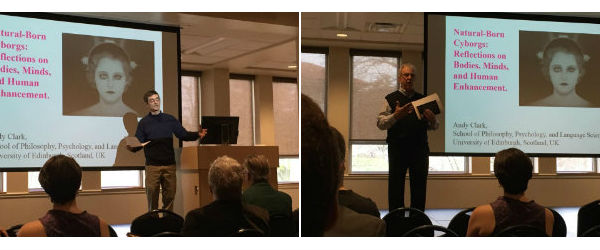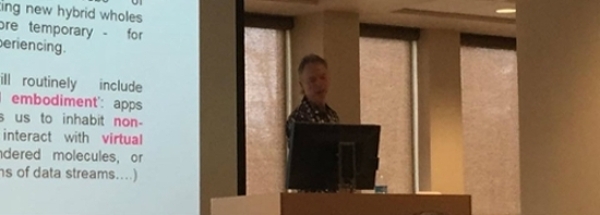Dr. Andy Clark
Andy Clark is a professor of philosophy and Chair in Logic and Metaphysics at the University of Edinburgh in Scotland. Before this, he was director of Cognitive Science Program at Indiana University in Bloomington, Indiana and previously taught at Washington University in St. Louis, Missouri and the University of Sussex in England. Professor Clark’s scholarship deals with the philosophy of mind and he is a leading scientist in mind extension. He has also written extensively on connectionism, robotics, and the role and nature of mental representation.
On April 3rd, 2015, Andy Clark gave a lecture based on his book Natural-Born Cyborgs? Reflections on Bodies, Minds, and Human Enhancement. At the beginning of his lecture, Dr. Clark offered the conclusion of his studies: “The human being, more than any other animal on the planet, is characteristically open to a cascade of biotechnological innovation. The deepest and most transformative biological technology mergers may not be the most obvious ones.” Then, he further explained his opinions to four aspects:
1. Augmenting the body
Human brains adapt very rapidly to the presence of a new, controllable “Third Arm”. Our natural body – considered the most stable set of transparent equipment through which we confront the wider world – is essential but still changeable and even alterable. Clark started with an example. “Normally you don’t feel as if you are using your hands to do the washing up. Stelarec controls the mechanical hand by means of surface electromyography (EMG)… After some practice, he hardly feels twitching his stomach muscles to move the third hand. Instead, he simply feels as if he directly wills the third hand to move, just as he wills his biological hands to move.” This demonstrated the “directionness” that characterizes our control over our own body parts has nothing to do with the nature of signal themselves.
2. Extending the senses
The first wave of human sense extension started in 1960s with the Tactile Visual Sensory Substitution (TVSS). In the “Blind Walk” experiment, after some practice, blind subjects started to report rough quasi-visual experiences of looming objects etc. Clark believes these examples clearly indicate the potential of sensory of human experience.
3. Enhancing the mind
Human brains are masters of productive laziness. The reason card tricks can fool us is because our brains gets too much information. In fact, we believe we encode more information than we actually do. “The world is external memory,” Clark said. “It is not that all the thinking that happens inside.” Our minds’ enhancement blurs the boundaries between what we know, what we sense, and what we actually are.
“You is just the larger distributed system,” Andy Clark concluded.
4. Why should we care?
Why it is important to prove the existence of Natural-Born Cyborgs? Clark believes that we should not accept a neural, or even a biological model of person and minds. Take, for instance, the case of Patrick Jones. He has severe memory impairments. Patrick cannot remember a person talked with him minutes ago. But with his smart phone and iCloud technology, he is able to recall whom he has spoken with, what was decided and so on. Patrick is currently living well with optimism and good humor.
On the other side, the moral question is, “how should we best identify familiar yet fluid items such as minds, persons, and agents?” Is the human biological, artificial, or a hybrid of the two, with a little bit of both so we cannot even tell where the boundaries are?



